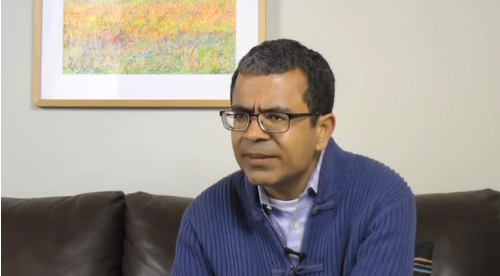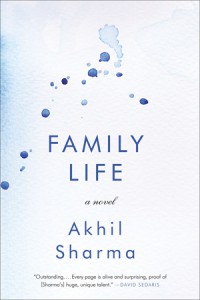“To me, the book still feels undone”: Akhil Sharma on Family Life
by Olivia Stransky / June 5, 2014 / No comments
Twelve years and 7,000 pages after publishing his debut novel, Akhil Sharma finally published his second book. Family Life , which has received near universal praise from, among others, The New York Times , The Guardian , and NPR , centers around Ajay, an Indian child whose family immigrates to the United States. Shortly after the move, his elder brother, the star of the family, is injured and ultimately brain-damaged , leaving Ajay adrift between two grieving parents.
In April 2014, Akhil Sharma came to Pittsburgh to read at City of Asylum Pittsburgh . Before the reading he met with Sampsonia Way to talk about the challenge of using his own life as inspiration, the importance of point-of-view in the novel, and why he almost gave up writing the book Family Life.
Ajay, the narrator of Family Life, is eight years old when the novel begins. How did you prepare for getting into the mind and voice of such a young narrator? What was the hardest part of capturing that perspective?
It took about twelve and a half years to write Family Life, so it wasn’t so much that I prepared for that voice and did it, as if preparing for a role. I was flailing around for most of a decade before I found the voice. But it’s not a pure first-person child’s point of view, since a child is not a very good medium of experience. A child can be as happy about flying a kite as about his mother recovering from cancer.
Consequently, the story is narrated from a distant viewpoint, which allows for more flexibility in terms of sentence structure and diction.
Your family emigrated from India to New Jersey in 1979. Family Life is set in New Jersey in the early 1980s. Was it challenging to recreate the place and time of your childhood?
Not really, because many of the physical spaces that are generated in the story are interiors, and interiors tend to remain timeless. There are some streetscapes and public spaces, like temples and schools, but that’s not where the bulk of the story occurs.
Ajay mentions that “the books I liked were science fiction and fantasy, books where things were not as complicated and unsatisfying as real life.” Was that also true of you?
Almost as soon as I began reading serious fiction, like Hemingway, science fiction began to seem pointless. Once you’ve smoked a cigar, smoking a cigarette feels like you’re smoking paper. It’s just not relevant to life anymore.
I say this about science fiction in general, but I actually mean bad science fiction, which is the bulk of science fiction. There is extraordinary science fiction that seems to work at the level of dream, myth, and nightmare in incredibly primal ways. That kind of science fiction is separate from stories of spaceship captains who fall in love with women who live on Venus.
You mentioned before that twelve and a half years passed between writing An Obedient Father and publishing Family Life. Why did it take so long?
I didn’t know what was I doing. I kept flailing and flailing, trying to figure it out. I didn’t know how to write from a child’s point of view or how to handle the absence of plot in the novel.
One of the main problems I experienced as I was reading my own pages was that I would begin a scene and think, “Why is this scene here? Why is this thing not an exposition? How much longer will this drag on?”
Plot versus story: A happens, and A causes B. There’s very little causation in this story. The accident occurs—A happens and B happens—but then A happens and G also happens.
I discovered that by removing certain details, like sound and smell, I thinned out the reality, making it less dramatically visceral. Because of that, the reader enters and leaves scenes with much less effort.
In the afterward, you mention that there was a period of time when you were going to give up on the novel, and even Lorin Stein, the editor of The Paris Review, suggested that you abandon the project. Could you tell me a little bit more about that?
I wanted to abandon the project, but I sunk so much time into it that that I felt like I had to see it through—not so that it would be of high quality, but so that it would be done. Lorin Stein read some of the pages and said, “Akhil, this is not going to work. Just give it up. Why spend good money on bad writing?” He said that three years into the process, and then I spent nine and a half more doing this miserable thing.
However, I’m glad that the book is done, and I’m proud of it. It was just so costly in terms of pain and time that I wish somebody else had written it.
When it was finally done, was that freeing or was it bizarre to have the burden taken off of you?
I have not read the reviews, so to me the book still feels undone, as if it’s not actually published and out in the world. I still have this nightmarish feeling that I’ll be asked to work on it again.
However, when I finished the book, I thought, “This is a good book. It reads like a rocket. It does the things that I want a book to do.” On the day I sent it to the publisher, I felt enormous relief and even began writing a new short story.
For this manuscript, I wrote 7,000 pages, or about 35 novels. Whenever I finish a draft, I begin the next draft with a blank canvas. For me, that’s a way to get the narrative to feel very tight, so that everything is essential. That’s what I do until the last six months, at which point I can say, “The book is basically ready.” After that, I just tighten some screws and test a few things.
Over those twelve years, what was the biggest structural change made to the book?
In terms of structure, the biggest change was going from third person to first person.
Why did you change the point of view?
Character makes fiction valuable. Since anything can happen in a fictional world, to some extent plot itself doesn’t matter. Instead, what matters is how plot affects characters. With a first person narrator, a character is always being affected. The fact that an “I” is walking down the street means that the experience has to be significant.
Third person consumes plot at a different rate than first person. Since the reader doesn’t assume that whatever is being described is significant, what counts in terms of story has to cross a higher threshold of importance and plot is burned up much more quickly.
During the rewriting process, what is your primary focus?
It’s almost never plot. It’s deciding what scene is necessary to move the thing forward. It’s the shapeliness of sentences. Sometimes it involves introducing a new character or getting rid of an old one.
For example, after the final draft was purchased, right before it went into copy editing, there was a chapter I removed and characters that were combined. Until late in the process, I wasn’t sure about the protagonist’s sexuality.
Family Life’s last chapter shifts from Ajay’s childhood to a relationship he has in his thirties. Why did you decide to break from the main narrative at that late point in the novel?
It’s interesting that you say that. When you began, I thought you were going to ask, “Why not stop at the scene with the flashlight?”
The book has two beginnings and two endings, by which I wanted to generate this weird modernist feel, like at the end of Remembrance of Things Past when the reader suddenly realizes, “Oh, everything that has occurred until now has been the freezing of a question. And now the real question—and the real answer—will start.”
That’s why the last section is there. We dealt with what we thought was the problem, but now we realize what the real problem is. A thing occurs, and the repercussions of it never end.
Are there other chapters of your life that you will write about?
I hope not. I have never written about my life before, and I hope to never do so again.






